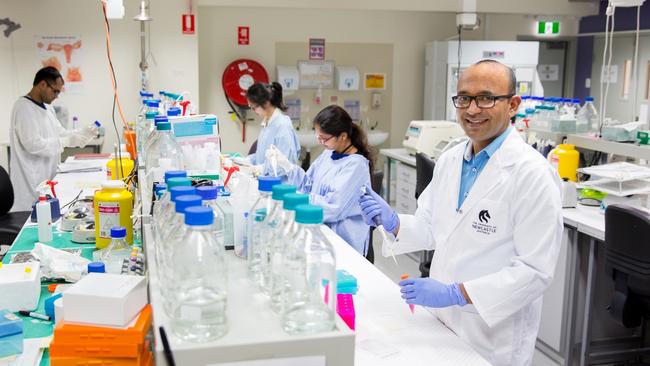Researchers look at link between ‘the pill’ and preventing cancer
Research finds those who take ‘the pill’ have a lower risk of gynaecological cancers, with mums who breastfeed reducing their risk and nuns being at the highest risk of cancer.
Newcastle
Don't miss out on the headlines from Newcastle. Followed categories will be added to My News.
- ‘Danielle died a gruesome death’: Police identify body found in creek
- Dog rescue: The heartwarming stories
Research has found nuns are at a higher risk of gynaecological cancers, while woman with more children and those who breastfeed are at a lower risk.
In the past ten years, researchers at the University of Newcastle and Hunter Medical Research Institution have been looking at the link between preventing cancer and contraceptive pills.
They are trying to shift the way society views ‘the pill’ and reproductive health, in an effort to reduce gynaecological cancers.
Associated Professor Pradeep Tanwar said they have been trying to understand the disparities between people who get gynaecological cancer and those who do.

“There are many labs around the world who have done studies on thousands of women and have found women who are taking contraceptive had almost 50 per cent reduction in their chances of getting cancer if they take contraception for three to five years,” Professor Tanwar said.
“Even the people who have the same mutations which are predisposed in cancer, only 50 per cent of people will end up with cancer at 70 years.”
The research looks at how changes in female reproductive hormones affect the risk of getting ovarian cancer and medicines already on the market can reduce the risk of the disease.
A breakthrough in 2016 uncovered that the combined contraceptive pill decreases the risk of ovarian cancer. It also discovered mums and those who breastfeed are at a reduced risk.
“If somebody is breastfeeding, there’s a 30 per cent reduction if they have a child, giving birth there is a reduction of 40 per cent and then subsequent child 14 per cent decrease risk,” Professor Tanwar added.
“It is true that catholic nuns have a very high risk of gynaecological cancers because naturally they are not taking contraceptives and they are also not giving birth.

“One of the challenges is that as we are evolving, we are moving away from what normally happens in a cycle and you’re expected to fall pregnant.
“In pregnancy you’re not going to have ovulation for the next nine months and your system will be dominated by progesterone.
“But if you’re constantly cycling and constantly going through this process of repair and damage, it makes cells more prone to cancer.
“Breastfeeding suppresses ovulation so you’re not going through the process.”
The research team are now trying to figure out how people who don’t want to take contraception, like nuns or those against it, can benefit from a pill just for cancer prevention.
“It’s using a similar kind of ingredients and coming to the outcome where you have risk reduction for gynaecological cancers,” he said.
“How we can change the focus from contraception to cancer prevention.

“We are trying to figure out how progesterone provides that protection so we can harness the power to have the same advantage, but don’t have the actual contraception.
“There are already many different drugs in the market which do the functions similar to progesterone and they are used for other gynaecological disorders such as fibroids and endometriosis.
“When we figure out what are the most effective ways and the doses, then we don’t need to go through the clinical trials to check the safety of these compounds so we just need to repurpose them for this purpose.”
The University was awarded a $566 thousand grant through the Ovarian Cancer Research Foundation over the next three years to continue its ongoing research.
